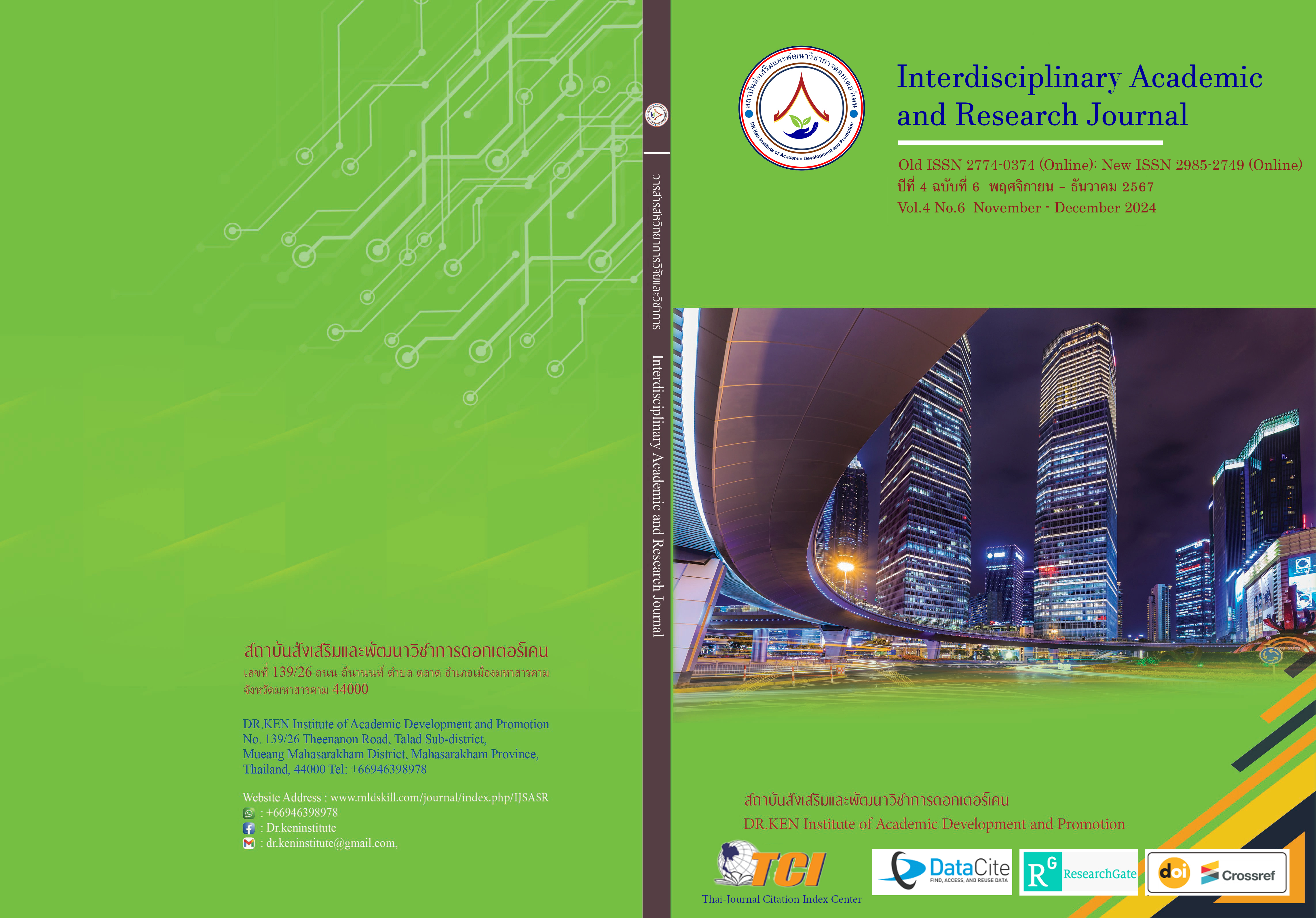Guidelines for Developing Operating According to The Roles and Responsibilities of School Committee under Khon Kaen Primary Educational Service Area Office 5
DOI:
https://doi.org/10.60027/iarj.2024.278705Keywords:
School Committee, Development Guidelines, Operations, Roles and ResponsibilitiesAbstract
Background and Aims: The Basic Education Commission is very important to the development of educational institutions. According to the law, every educational institution must appoint a basic education committee. Effective educational administration must decentralize power to the school committees in the education area directly responsible for supervising, promoting, and supporting the business. Define the concept of educational management, strategy, vision, objectives, indicators, and development guidelines. This research objective of to 1) Study the current condition. Desired conditions and necessary needs of operations according to the roles and responsibilities of the educational committee. 2) Study guidelines for developing operations according to the roles and responsibilities of the educational committee.
Methodology: The study is divided into 2 phases: Phase 1 studies the current condition. Desired conditions and necessary needs for operating according to the roles and responsibilities of school committee. The sample consisted of 394 people, divided into 128 school directors, 133 school committee chairmen, and 133 teacher representatives. The sample was sampled using a stratified random sampling method. The tool used was a questionnaire. There is index of congruence value 0.80 - 1.00, the confidence value for the current condition is equal to 0.93, the discriminatory power value is between 0.38 - 0.82, and the confidence value for the desired condition is equal to 0.94. The discriminatory power value is between 0.36 - 0.84. Statistics used in research, it is frequency, percentage, mean, standard deviation and the index value for prioritizing essential needs, Phase 2, guidelines for developing operations according to the roles and responsibilities of the school board From 9 experts, the tool is an interview form and content analysis by interpreting and presenting it descriptively.
Results: The findings of this research were as follows: 1) The current conditions for operating according to the roles and responsibilities of the school committee as a whole and in each area are at a moderate level. Overall each aspect of the desired condition is at the highest level and the modified priority needs index is between 0.46 - 0.51. 2) Guidelines for developing operating according to the roles and responsibilities of school committee found 18 development guidelines: 1) Building relationships between communities and coordinating with both public and private organizations in 3 approaches: 2) Policy, development plan, and action plan 4 approaches 3) Children's rights Caring for disabled children underprivileged children and children with special abilities, 4 approaches, 4) Management of all 4 departments, 4 approaches, and 5) Operations according to this regulation and performing other tasks as assigned 3 approaches. The results of the evaluation of development approaches Carry out work according to the roles and responsibilities of the school committee. There is appropriateness and feasibility overall and in each aspect. At the highest level.
Conclusion: A school's management and achievement of the objectives set by the following key components must be carried out via an operational approach that adheres to the role and responsibilities of the school board: (1) Policy/Development Plan/Action Plan. (2) Overseeing each of the four departments. (3) Rights of children; providing care for children with disabilities; disadvantaged children; and children with exceptional abilities. (4) Establishing connections between local communities and working with both governmental and private entities. and 5) carrying out tasks as delegated and in compliance with these regulations.
References
กระทรวงศึกษาธิการ. (2564). กรอบแผนพัฒนาเศรษฐกิจและสังคมแห่งชาติ ฉบับที่ 13 พ.ศ. 2564. Retrieved on 10 October 2022 from https://www.bic.moe.go.th/images/stories/pdf/แผนพัฒนาเศรษฐกิจและสังคมแห่งชาติ_ฉบับที่13_4-11-2565.pdf
กระทรวงศึกษาธิการ. (2547). คู่มือการปฏิบัติงานคณะกรรมการการศึกษาขั้นพื้นฐาน. กรุงเทพฯ:: คุรุสภาลาดพร้าว
กระทรวงศึกษาธิการ. (2562). พระราชบัญญัติการศึกษาแห่งชาติ พ.ศ.2542 และที่แก้ไขเพิ่มเติม พ.ศ. 2562. Retrieved on 10 October 2022 from https://www.moe.go.th
ญาณิน ปะติตัง. (2564). บทบาทของคณะกรรมการสถานศึกษาขั้นพื้นฐานที่ส่งผลต่อสมรรถนะสำคัญของผู้เรียนในโรงเรียน สังกัดสำนักงานเขตพื้นที่การศึกษาประถมศึกษากระบี่. วารสารวิชาการ มจร บุรีรัมย์. 6(2), 46-60.
ดรัลรัตน์ ฮามพิทักษ์. (2562). แนวทางการมีส่วนร่วมของคณะกรรมการสถานศึกษาขั้นพื้นฐานในการบริหารและการจัดการศึกษาของโรงเรียน สังกัดสำนักงานเขตพื้นที่การศึกษามัธยมศึกษา เขต 19. วารสารบัณฑิตศึกษา มหาวิทยาลัยราชภัฏสกลนคร, 16 (74), 118 -130
เทียมจิต คงอรุณ. (2561). การปฏิบัติตามบทบาทหน้าที่ของคณะกรรมการสถานศึกษาขั้นพื้นฐานของโรงเรียนในเขตอำเภอท่าเรือ สังกัดสำนักงานเขตพื้นที่การศึกษาประถมศึกษาพระนครศรีอยุธยา เขต 1. วารสารวิชาการบัณฑิตวิทยาลัย มหาวิทยาลัยสวนดุสิต, 14 (2), 117 - 126
นิตยา แก้วแสนชัย. (2558). การบริหารแบบมีส่วนร่วมของชุมชนในโรงเรียน สังกัดสำานักงานเขตพื้นที่การศึกษาประถมศึกษาขอนแก่น เขต 4. วารสารศึกษาศาสตร์ ฉบับวิจัยบัณฑิตศึกษา, 9(3), 77 – 85
บุญชม ศรีสะอาด. (2560). การวิจัยเบื้องต้น. พิมพ์ครั้งที่ 10. กรุงเทพฯ: สุวีริยาสาส์น.
ปรียาภรณ์ พรหมบางญวน. (2564). การมีส่วนร่วมในการบริหารของคณะกรรมการสถานศึกษาขั้นพื้นฐานตามหลักสังคหวัตถุ 4 ของโรงเรียนในสำนักงานเขตพื้นที่การศึกษาประถมศึกษาชุมพร เขต 2. วารสารบัณฑิตศึกษามหาจุฬาขอนแก่น 8 (2),192-207
ไพศาล วรคำ. (2562). การวิจัยทางการศึกษา. พิมพ์ครั้งที่ 11, มหาสารคาม: ตักศิลาการพิมพ์
ฤทัยรัตน์ ปัญญาสิม. (2560). การบริหารงานแบบมีส่วนร่วมที่ส่งผลต่อประสิทธิผลการ บริหารสถานศึกษา. วารสารศิลปากรศึกษาศาสตร์, 9(1), 124 – 132.
ลดาวรรณ นิ่มทับทิม. (2561). บทบาทของคณะกรรมการสถานศึกษาขั้นพื้นฐานในการสนับสนุนแหล่งเรียนรู้ในสถานศึกษา สังกัดสำนักงานเขตพื้นที่การศึกษาประถมศึกษาพระนครศรีอยุธยาเขต 2. วารสารครุศาสตร์ปริทรรศน์, 5(2), 86-95
สำนักงานเขตพื้นที่การศึกษาประถมศึกษาขอนแก่น เขต 5. (2566). แผนพัฒนาการศึกษาขั้นพื้นฐานระยะ 5 ปี (พ.ศ. 2566 – 2570). Retrieved on 19 October 2022 from http://web.kkn5.go.th/?p=2290
สำนักงานคณะกรรมการการศึกษาแห่งชาติ. (2542). พระราชบัญญัติการศึกษาแห่งชาติ พ.ศ. 2542. กรุงเทพฯ: สำนักงานคณะกรรมการการศึกษาแห่งชาติ.
สำนักงานเลขาธิการสภาการศึกษา. (2560). แผนการศึกษาแห่งชาติ พ.ศ. 2560 – 2579. กรุงเทพมหานคร: พริกหวานกราฟฟิค จำกัด
สำนักทดสอบทางการศึกษา กระทรวงศึกษาธิการ. (2565). รายงานผลการทดสอบทางการศึกษาระดับชาติขั้นพื้นฐาน. กรุงเทพฯ: ห้างหุ้นส่วนจำกัดโรงพิมพ์อักษรไทย
สุวิมล ว่องวาณิช. (2558). การประเมินความต้องการจำเป็น. พิมพ์ครั้งที่ 3, กรุงเทพฯ: สำนักพิมพ์แห่งจุฬาลงกรณ์มหาวิทยาลัย.
Chuwa, I.D. (2018). The role of school committees in ensuring the quality of primary education in Magu district, Tanzania. Institutional Repository at The University of Dodoma, an open-access institutional repository
Cimailing, N. (2021). The Important Role of the School Committees in Implementing School-Based Management. Jurnal Pendidikan Tambusai, 5, 5187-5194
Herwan, H. (2018). The Role of School Committee in Supporting The Fulfillment of Education Facilities and Infrastructure. Journal of Education, Teaching and Learning 3(2), 282-287
Rebecca White, B.A. (2021). The Relationship Between Administration and Inclusive Education: Perspectives From One Ontario School Board. Brock University
Downloads
Published
How to Cite
Issue
Section
License
Copyright (c) 2024 Interdisciplinary Academic and Research Journal

This work is licensed under a Creative Commons Attribution-NonCommercial-NoDerivatives 4.0 International License.
Copyright on any article in the Interdisciplinary Academic and Research Journal is retained by the author(s) under the under the Creative Commons Attribution-NonCommercial-NoDerivatives 4.0 International License. Permission to use text, content, images, etc. of publication. Any user to read, download, copy, distribute, print, search, or link to the full texts of articles, crawl them for indexing, pass them as data to software, or use them for any other lawful purpose. But do not use it for commercial use or with the intent to benefit any business.
















.png)


